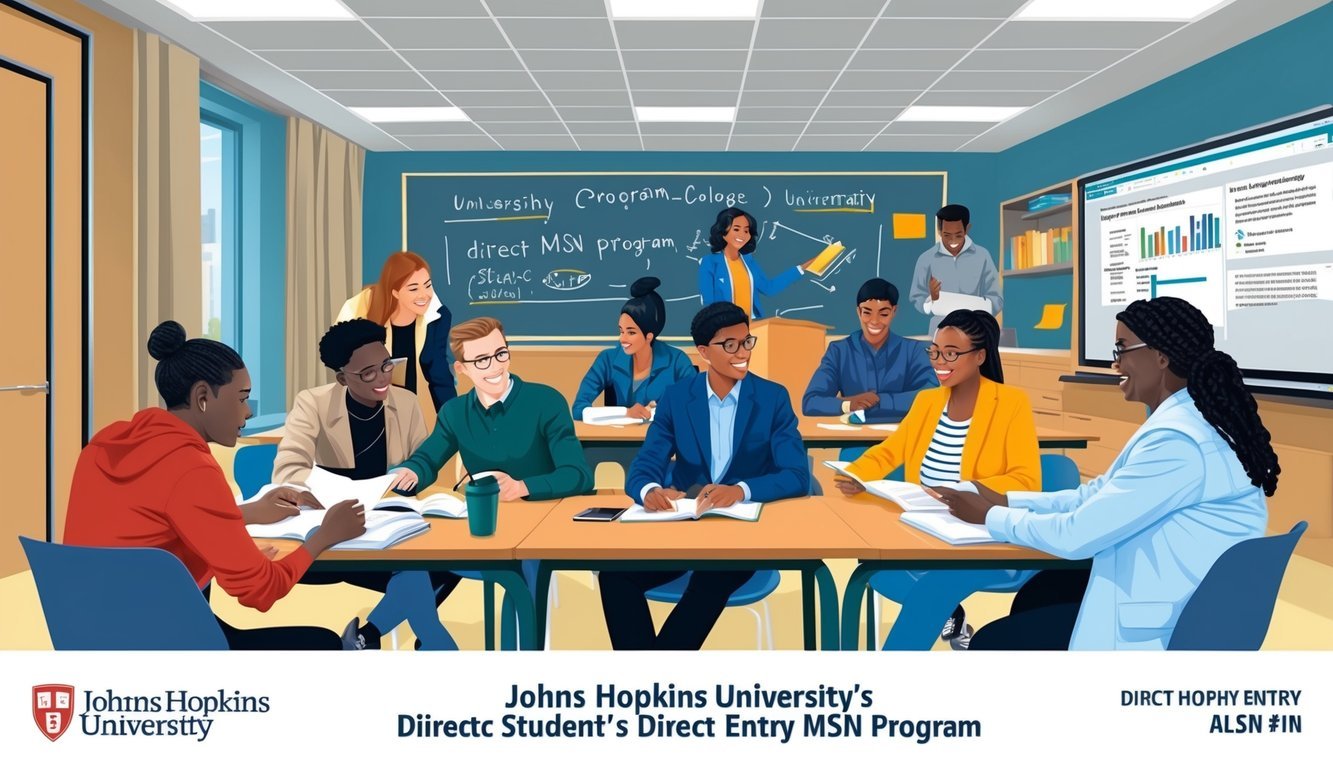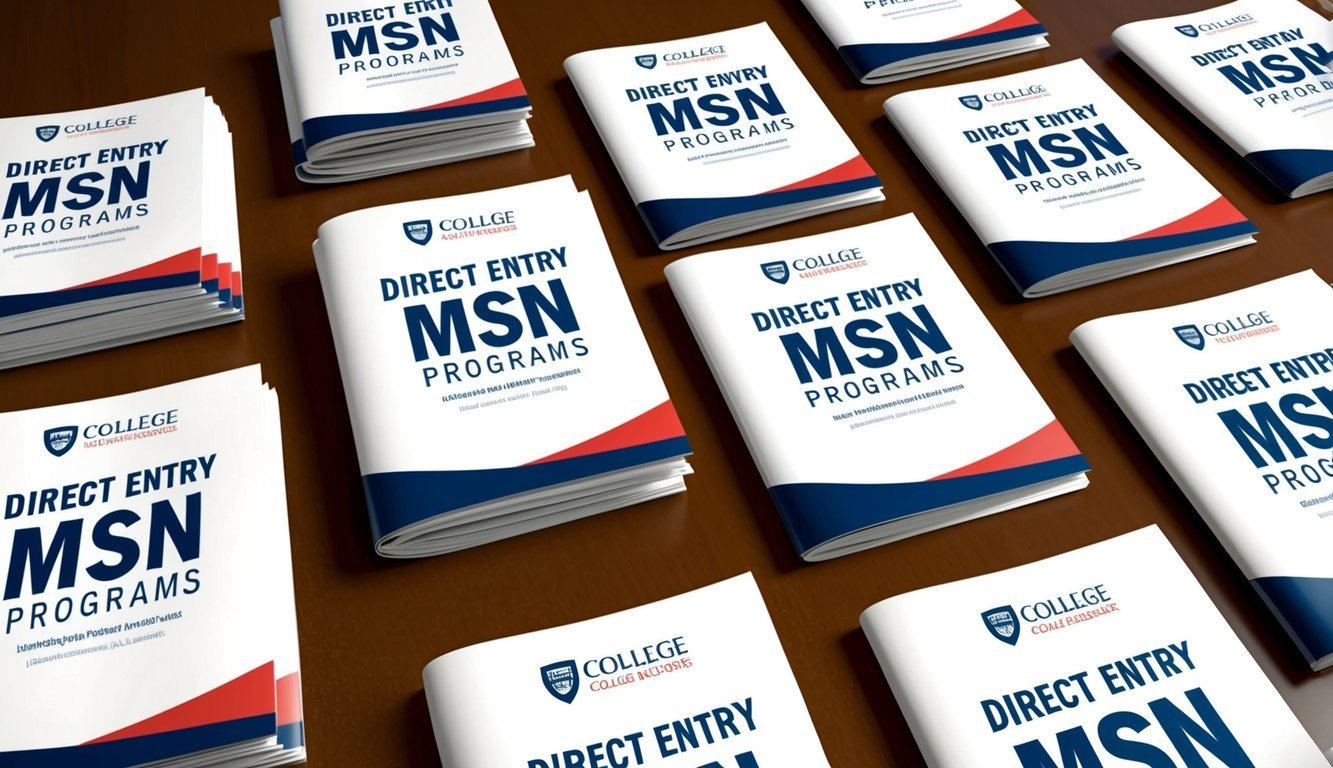Direct-entry Master of Science in Nursing (MSN) programs are an increasingly popular pathway for individuals seeking to transition into nursing from other academic backgrounds.
These programs provide a comprehensive education that prepares you for a rewarding career as a registered nurse, even if your previous degree is in a non-nursing field. Finding the best direct-entry MSN program can significantly impact your career trajectory and opportunities in the nursing profession.
Many of these programs offer an accelerated curriculum and can often be completed in a shorter time frame than traditional nursing degrees.
You will gain essential clinical skills, knowledge, and competencies that are vital for nursing practice.
Understanding the factors that differentiate these programs, such as cost, format, and acceptance rates, will help you make an informed decision about your education and career path.
Yale University School of Nursing

Yale University offers a robust Master of Science in Nursing (MSN) program tailored for individuals seeking advanced nursing roles.
The curriculum is designed to transform you into an advanced practice nurse, equipping you with the necessary skills for various healthcare specialties.
The direct entry MSN program integrates rigorous academic coursework with practical clinical experiences.
You will participate in hands-on learning guided by experienced faculty who are active in their clinical practices.
You can choose from various specialties, including Nurse-Midwifery, preparing you for essential roles in family-centered primary health care.
The program emphasizes a commitment to improving healthcare accessibility for all individuals.
Yale’s MSN program also addresses the growing demand for nurse practitioners, with a focus on high-quality education and diverse career opportunities.
Upon graduation, you will be well-prepared to contribute positively to the healthcare landscape.
For more detailed information about the program’s structure and admission requirements, you may explore the Graduate Entry Pre-Specialty in Nursing program page and the Master of Science in Nursing overview.
2) Johns Hopkins University

Johns Hopkins University offers a Direct Entry Master of Science in Nursing (MSN) program that prepares you for a nursing career in just five semesters.
This program is designed for individuals with a bachelor’s degree in a non-nursing field.
The curriculum emphasizes leadership, global impact, and evidence-based practice.
You will engage in interprofessional education, giving you a well-rounded experience.
The program includes clinical placements that allow you to apply your learning in real-world settings.
Admission criteria are competitive, focusing on academic performance and relevant experience.
You can find detailed information about requirements and application processes on the Johns Hopkins School of Nursing website.
Tuition rates and financial aid options are clearly outlined, helping you plan your education financially.
This program is a strong choice if you are looking to transition into nursing with a solid educational foundation.
For those exploring various MSN options, check out comparisons of top programs on platforms like Nurse.org or allnurses.
University of California—San Francisco

The University of California—San Francisco (UCSF) offers a comprehensive Direct-Entry Master of Science in Nursing (MSN) program.
This program is ideal for individuals holding a bachelor’s degree in a non-nursing field who aspire to become registered nurses.
UCSF emphasizes a rigorous curriculum that combines classroom instruction with clinical experience.
You will engage in hands-on training in various healthcare settings, which prepares you for diverse nursing roles.
Key features of the program include:
| Feature | Details |
|---|---|
| Degree Offered | Master of Science in Nursing |
| Program Length | Typically 2 to 3 years |
| Clinical Experience | Extensive hands-on training |
| Accreditation | Fully accredited by the Commission on Collegiate Nursing Education (CCNE) |
You are expected to complete prerequisite courses before starting the MSN program.
The program also highlights interprofessional education, enhancing teamwork skills essential for today’s healthcare environment.
For more information about admission requirements and course specifics, you can visit the UCSF School of Nursing website.
4) Columbia University
Columbia University offers a highly regarded Direct Entry Master’s in Nursing (MDE) program designed for non-nursing graduates.
This 15-month accelerated program prepares you to become a registered nurse.
The MDE program is located in New York City and is known for its rigorous academic standards.
You will gain practical experience through extensive clinical partnerships and a state-of-the-art simulation lab.
Key program details include:
| Feature | Information |
|---|---|
| Length of Program | 15 months |
| Application Deadline | November 1 |
| Program Start Date | June |
| Contact Information | 212-305-2862 |
Columbia emphasizes evidence-based practice and fosters an interprofessional learning environment.
This approach prepares you to meet the complex demands of healthcare today.
For more information on admissions and program specifics, visit the Columbia School of Nursing’s MDE Program page.
5) University of Pennsylvania

The University of Pennsylvania offers a Master of Professional Nursing (MPN) program, designed for individuals with non-nursing bachelor’s degrees.
This accelerated, 15-month curriculum prepares you to become a registered nurse (RN).
The program emphasizes core nursing skills, including population health and clinical practice.
You will observe a strong focus on scientific inquiry, enhancing your ability to translate evidence into practice.
Additionally, Penn Nursing provides the Master of Science in Nursing (MSN) program, which includes various specialty areas.
This can lead to advanced roles in nursing, fostering leadership and quality improvement skills.
With a robust network and resources, graduating from Penn can significantly enhance your career opportunities in nursing.
For more information, consider visiting the Penn Nursing Programs page.
6) Duke University
Duke University offers a Master of Nursing (MN) program designed for individuals entering the nursing profession.
This program emphasizes a comprehensive approach to nursing education.
With a commitment to excellence, Duke provides access to outstanding faculty and resources.
You will find a strong support system aimed at helping you succeed in your nursing career.
The MN program prepares you for various nursing roles, ensuring you are practice-ready upon graduation.
This includes training in clinical skills, patient care, and leadership.
Duke is recognized for its innovative online nursing education.
Its MSN program was named the #1 Online Nursing Education Program in the nation by U.S. News & World Report.
Duke’s location in Durham, North Carolina, provides opportunities for clinical placements in diverse healthcare settings.
This enhances your practical experience while studying.
If you want to learn more about admissions and specific program details, visit the Duke University School of Nursing Admissions page.
7) University of Michigan—Ann Arbor
The University of Michigan—Ann Arbor offers a highly regarded Master of Science in Nursing (MSN) program.
It is consistently ranked among the top 10 nursing programs nationally.
You will benefit from the university’s strong mentorship network, which helps you design a personalized program plan.
This plan includes tailored clinical placements that align with your career goals.
The MSN program emphasizes a robust curriculum, focusing on advanced nursing practice and leadership skills.
You will engage with faculty experts and collaborate with clinical partners to enhance your learning experience.
Admission requirements include a bachelor’s degree in any field, along with evidence of your academic preparedness.
You may also need to demonstrate proficiency in English, with test scores sent directly to the university.
For more detailed information on this program, visit the University of Michigan MSN page.
Additionally, you can explore various aspects of the program—including costs and resources—on the admission requirements page.
8) Emory University
Emory University’s Master of Nursing (MN) pathway to the Master of Science in Nursing (MSN) is designed for non-nursing graduates.
This program allows you to transition into nursing seamlessly.
Key features of the program include no standardized test requirements for admission.
You only need to submit your official transcripts, preferably through electronic systems.
Emory is known for its robust curriculum and diverse specialties.
You can choose from various NP pathways, including Adult-Gerontology Primary Care and Family Nurse Practitioner tracks.
The program also offers flexible learning options.
This can be beneficial for students balancing work and study.
Located in Atlanta, Georgia, Emory University provides an enriching educational experience.
The campus has state-of-the-art facilities and access to clinical sites for hands-on training.
For more details on admission requirements and program specifics, visit Emory University – School of Nursing.
With Emory’s esteemed faculty and comprehensive coursework, you can gain the skills necessary to excel in the nursing field.
9) University of Washington

The University of Washington offers a highly regarded Direct-Entry Master of Nursing program.
This program is designed for individuals who hold a bachelor’s degree in a non-nursing field.
You can expect a comprehensive curriculum that combines both theory and practical skills.
The program typically spans two to three years, depending on your pace and specialty choice.
Students engage in various clinical placements, providing valuable hands-on experience.
This helps in developing competencies in diverse healthcare settings.
Tuition costs can range significantly, so it’s advisable to contact the university for the most current rates.
This ensures you are informed about any financial commitments upfront.
The University of Washington’s program emphasizes evidence-based practice and leadership, preparing you for a successful career in nursing.
You can learn more about their offerings through their official website here.
Consider this program if you seek a rigorous education that fosters both personal and professional growth in nursing.
10) Vanderbilt University
Vanderbilt University is a prominent option for a direct entry Master of Science in Nursing.
Their program is for individuals with a bachelor’s degree in a non-nursing field.
Vanderbilt offers an accelerated course of study.
You can expect multiple entry options, catering to both nurses and non-nurses.
The curriculum features a variety of advanced practice specialties.
This allows you to tailor your education to your career goals, such as becoming a nurse practitioner or nurse-midwife.
Vanderbilt’s program boasts high licensure pass rates.
Graduates are well-prepared for successful careers in nursing.
The university also provides hybrid learning opportunities.
This flexibility can be beneficial for balancing your education with personal responsibilities.
You can find more information on their offerings at the Vanderbilt School of Nursing.
This resource will provide details on specializations and admission requirements to support your decision-making process.
Understanding Direct Entry MSN Programs
Direct Entry MSN programs offer a pathway for individuals with a non-nursing background to become registered nurses and earn a Master of Science in Nursing.
These programs are designed to bridge the gap by providing the necessary education, clinical training, and specialization in nursing practice.
Definition and Overview
A Direct Entry MSN program allows students to transition from another field of study into nursing.
Typically, these programs require you to hold a bachelor’s degree in a non-nursing discipline.
Students engage in both theoretical coursework and hands-on clinical experiences over a span of two to three years.
For instance, programs like that at Johns Hopkins University emphasize leadership and evidence-based education.
Each program has unique features, but the core goal remains the same: preparing you to pass the NCLEX-RN exam and enter the nursing workforce.
Benefits of Direct Entry
Several advantages come with pursuing a Direct Entry MSN program.
Key benefits include:
- Accelerated Pathway: You can earn both your MSN and RN credentials faster than traditional routes.
- Specialization Options: Many programs offer various specialties in nursing, allowing you to focus on your interests, such as family practice or mental health.
- Strong Job Market: With a nursing shortage projected in the coming years, you’ll find a wealth of job opportunities upon graduation.
Additionally, the integration of leadership training prepares you for advanced roles in the healthcare system.
The financial investment varies, but knowing that tuition often ranges between $20,000 to $100,000 can help you budget effectively.
Look into specific programs for accurate tuition estimates, such as those listed on Nurse.org.
Curriculum and Structure
The curriculum for direct-entry MSN programs focuses on equipping you with both theoretical knowledge and hands-on experience.
The program is typically divided into core courses and clinical experiences, which together create a comprehensive learning environment.
Core Courses
In the core courses of a direct-entry MSN program, you’ll study essential subjects that lay the foundation for nursing practice.
Common courses include:
- Advanced Health Assessment: Develop skills to perform detailed health evaluations.
- Pathophysiology: Understand the biological mechanisms behind diseases.
- Pharmacology: Gain insight into drug classifications and their clinical applications.
- Nursing Theory: Explore frameworks that guide clinical decision-making.
Programs may also cover leadership, ethics, and healthcare policy.
These courses prepare you to function effectively in diverse environments, merging scientific knowledge with compassionate care.
Clinical Experience
Clinical experience is a pivotal component of your training.
In clinicals, you’ll put theoretical concepts into practice.
Typically, you will engage in:
- Simulation Labs: Here, you’ll participate in realistic scenarios to hone critical skills.
- Preceptorships: In preceptorships, you’ll work alongside experienced nurses in various healthcare settings.
- Specialty Rotations: Lastly, you’ll gain exposure to different nursing specialties, such as pediatrics, geriatrics, and mental health.
Expect to commit 30 to 40 hours per week to clinical training.
This hands-on experience is crucial for developing practical competencies.
It not only enhances your skills but also builds confidence in delivering quality patient care.
For more details, consider visiting Nurse.org.

